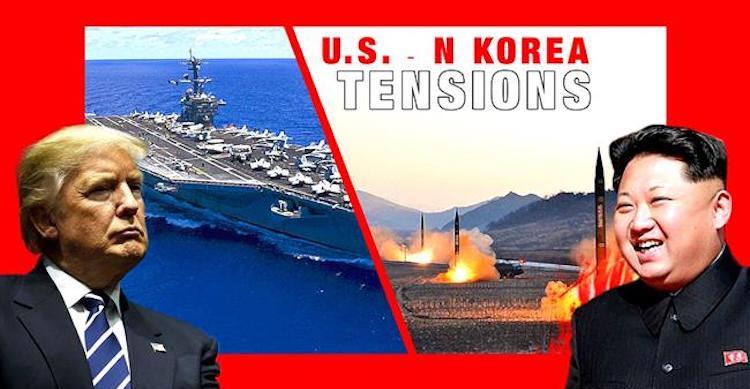By Pugwash Conferences on Science and World Affairs
This is the text of a statement issued on May 4 by Pugwash President Jayantha Dhanapala, Secretary General Paolo Cotta-Ramusino, Executive Committee Chair Steve Miller, Council Mark Suh and Executive Committee’s Tatsujiro Suzuki. – The Editor
KANDY, Sri Lanka (IDN-INPS) – The mounting confrontation with North Korea is raising grave dangers. Both sides have made potentially escalatory moves. Indeed, the combination of harsh rhetoric and threatening military actions has produced a situation that has been characterized by some in the United States as a Cuban missile crisis in slow motion. As was true in 1962, there is an unusual sense that events can slip out of control, that disastrous outcomes could result from the dynamics now underway in Northeast Asia.
The Cuban crisis is a cautionary tale. When Robert McNamara talked with Fidel Castro in 1992, 30 years after the crisis, he discovered that Castro had been ready to accept enormous risks and to absorb enormous costs in order to advance his interests in the nuclear confrontation with the United States. North Korea, too, seems as if it is a major, potentially reckless, risk-taker.
North Korea, too, may be willing to bear vast costs, perhaps even national suicide, in its effort to protect its security, its political system, and its way of life. Pyongyang seems to believe that risky behaviour will strengthen its position and help it to “win” the confrontation.
The North Korean leadership wants to be reassured of their security and prevent any regime change. Instead, however, North Korea’s actions prompt counter-reactions from the United States and other international actors, including threats and military deployments and manoeuvres.
The result is that both sides are exposed to escalatory dangers and to the risk that things can slip out of control. Should conflict erupt between these nuclear-armed adversaries, the possibility of nuclear use is unavoidable. This is an extremely dangerous prospect: even the limited use of nuclear weapons will have devastating consequences for the people of Northeast Asia and dramatic consequences at the global level.
As in the case of the Cuban missile crisis, the goal should be to find solution of the crisis in clear and direct communication, reciprocal understanding, and de-facto (even partial) accommodation. The wise approach is to find a path to de-escalation rather than intensification of inflammatory rhetoric and military behaviours.
It is desirable to ease concerns in Washington and Pyongyang. At a minimum, each side should reassure the other that conflict is not desired and that the status quo should not be changed by force. This should reduce fears on both sides of the divide, as well as reduce the perceived need by the two sides to take risky steps for the sake of bolstering their deterrence postures.
Moves to cool the military temperature should be accompanied by efforts to restore the diplomatic track. Importantly, in recent days both President Trump and Secretary of State Tillerson have expressed an interest and a willingness to engage in negotiations with North Korea – a positive development in an otherwise worrying picture.
North Korea should be encouraged to respond favourably to Washington’s openness to negotiation. It is not clear what form resumed negotiations might take, but an obvious option is for the United States, in coordination with China, Russia, Japan and South Korea, to aim for a restoration of the 6-party talks. There should be no illusion that the diplomatic track will be easy or rapidly successful, but diplomatic struggles are preferable to military crisis and the attendant risk of war.
In 1962, a disastrous war was narrowly averted because Kennedy and Khrushchev communicated directly, negotiated urgently, made necessary accommodations, and stepped back from the brink. Can President Trump and Kim Jong Un avoid a catastrophic end to their brewing crisis? A needed first step is restraint and responsible behaviour on all sides and a mutual pullback from the intensifying military confrontation. The world needs to be spared a dramatic conflict with possibly catastrophic consequences. [IDN-InDepthNews – 4 May 2017]
Image credit: presstv.com
IDN is flagship agency of the International Press Syndicate
facebook.com/IDN.GoingDeeper – twitter.com/InDepthNews

